The future has always fascinated humankind. If we think about the future now, some of us imagine cyberpunk, others a post-apocalyptic world. There are many futures that we could have. One question that Angie’s List asked is how people in the 1950s, for example, imagined the future. Well, here are some pictures showing us just that.
The people before us imagined that we would have some pretty wacky inventions by now. However, there probably aren’t many people washing their couches with a hose in the 2020s, and robots are still not doing our makeup. Many interior designs seem a little over the top as well, although there is no doubt someone out there would love to live in a house like that.
The inspirational images were taken from the movies Back to the Future or from people from the past, like Italian industrial designer Joe Cesare Colombo or American science fiction author and astrophysicist Gregory Benford.
What do you think about these ideas? If you have any ideas for the future that awaits us, share in the comments!
More info: angieslist.com
Living room (1950s)
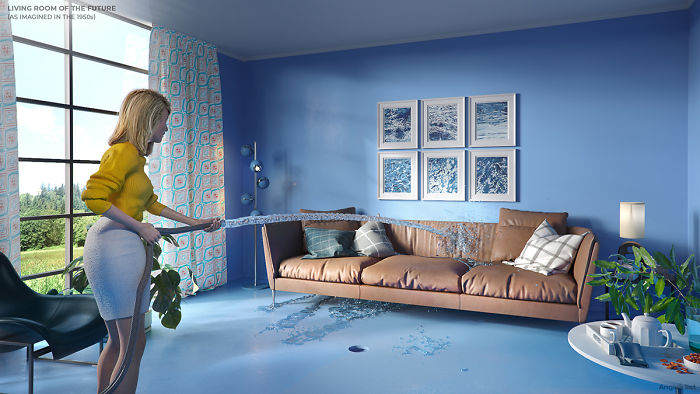
Image credits: Angie’s List
“What is the most awesome technological development you can imagine being applied to our living rooms in the future? For the author of a February 1950 article in Popular Mechanics, the answer was: waterproofing. ‘When Jane Dobson cleans house, she simply turns the hose on everything,’ wrote Waldemar Kaempffert on how life would be in the year 2000. ‘Everything hefty would be made of plastic or other waterproof synthetics. Lighter things like tablecloths were to be mock-linen, woven from incinerator-ready paper yarn.'”
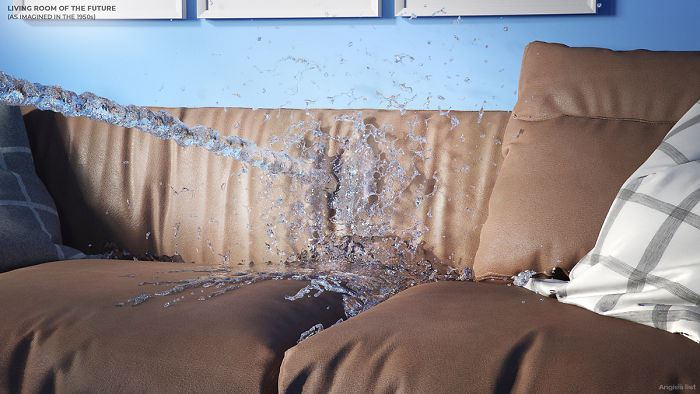
Image credits: Angie’s List
“Drying your freshly-hosed living room would be no problem. ‘After the water has run down a drain in the middle of the floor (later concealed by a rug of synthetic fiber) Jane turns on a blast of hot air and dries everything,’ reports Kaempffert. Housewives of the 1950s must have really hated feather dusters. (To his credit, Kaempffert predicted ‘shopping by picture phone’ in the same article.)”
Inspiration photo

Image credits: Gregory Benford And The Editors Of Popular Mechanics
Kitchen (1960s)
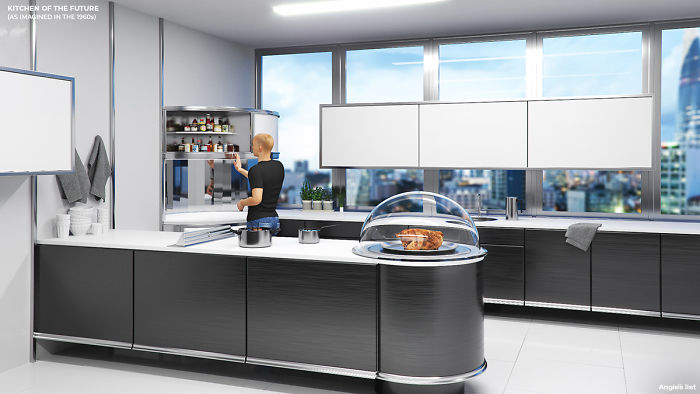
Image credits: Angie’s List
“Those same hose-wielding housewives could save on the dishwashing by using disposable plastic plates that simply melt away in hot water, according to Kaempffert’s article. But one home appliance company dared to think a bit more space-age: dishwashing with ultrasonic waves!”
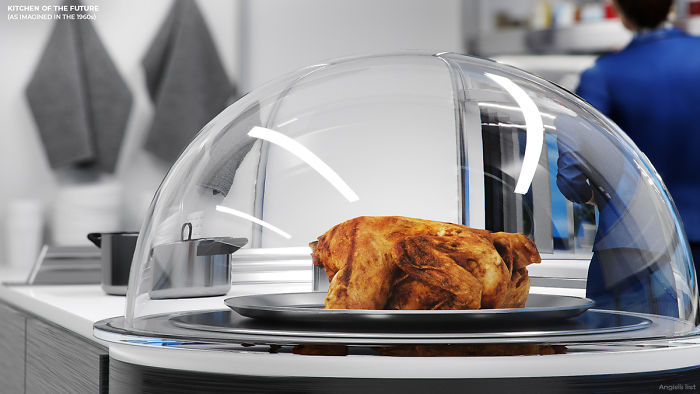
Image credits: Angie’s List
“Frigidaire, like Kaempffert, dared to imagine a networked, IoT age. They suggested a ‘hands-free, distant-talking TV telephone’ with a 50-number memory bank that could be used to start your glass-dome countertop oven from anywhere in the world (as well as to open and close windows).”
Inspiration photo
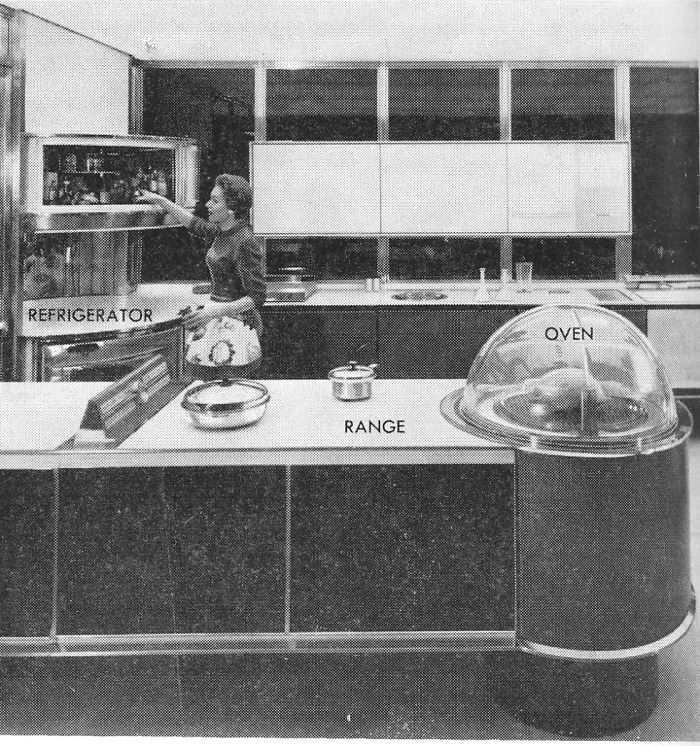
Image credits: Gregory Benford And The Editors Of Popular Mechanics
Master bedroom (1960s)
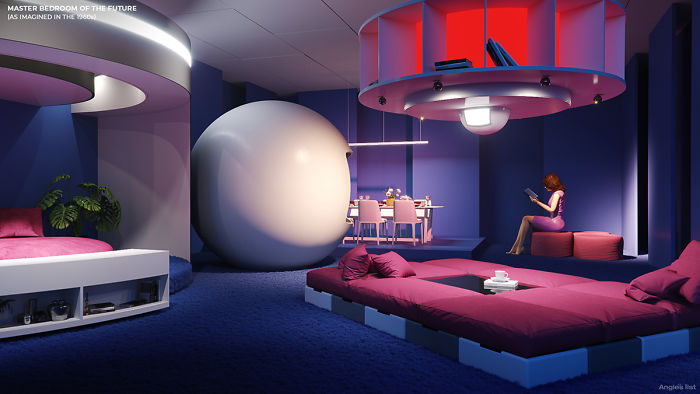
Image credits: Angie’s List
“Joe Colombo was a visionary designer who believed in fluid, adaptable systems for a living. His 1969 ‘Futuristic Habitat’ project imagined an open-plan home comprised of a ‘Central-Living’ leisure space, air-conditioned ‘Kitchen-Box,’ and this ‘Night Cell.’
The Night Cell sleeping area featured a Barbarella-style, climate-controlled sleeping pod, as well as a bathroom and wardrobes. The retro-futuristic furniture wouldn’t be out of place in science-fiction series World On A Wire.”
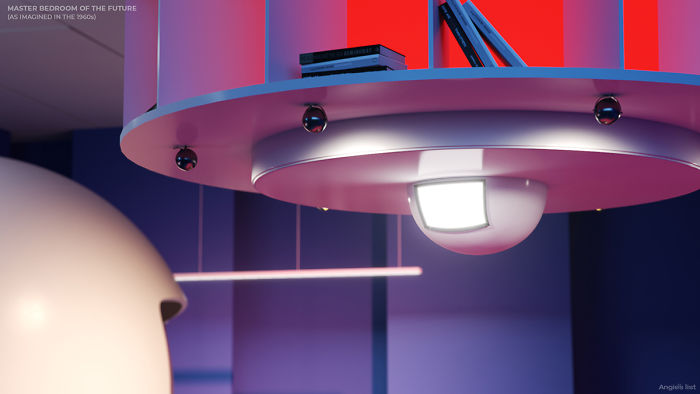
Image credits: Angie’s List
“You can see a video of the Futuristic Habitat in action on YouTube. Celebrated designer Colombo, who was to die on his 41st birthday, walks in towards the end, puffing his pipe. Colombo’s sleeping arrangement of choice was a drop-top Cabriolet bed that he designed, complete with control panel, cigarette lighter, radio, and phone.”
Inspiration photo
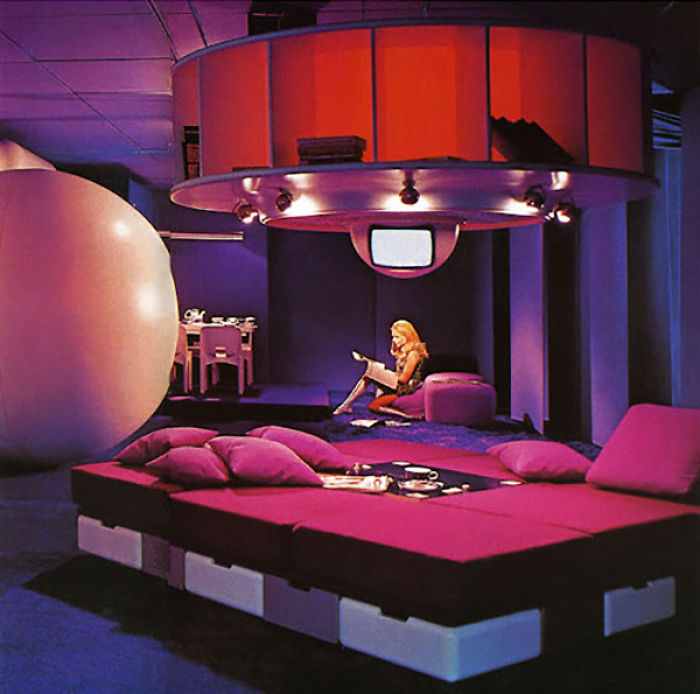
Image credits: Joe Cesare Colombo
Game room (1960s)
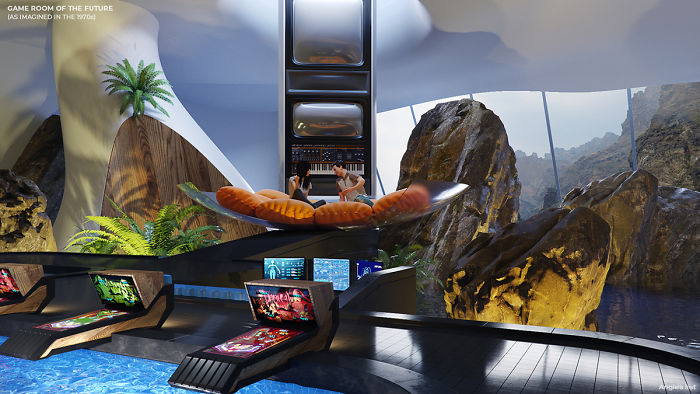
Image credits: Angie’s List
“Paul Alexander’s illustration of a futuristic game room seems designed to encourage gamers to look up from their screens and engage with both the nature and the technology around them. Lounge in the pool while playing waters-edge pinball, or curl up on your dish-shaped sofa with a close friend to dabble on the multimedia station.”
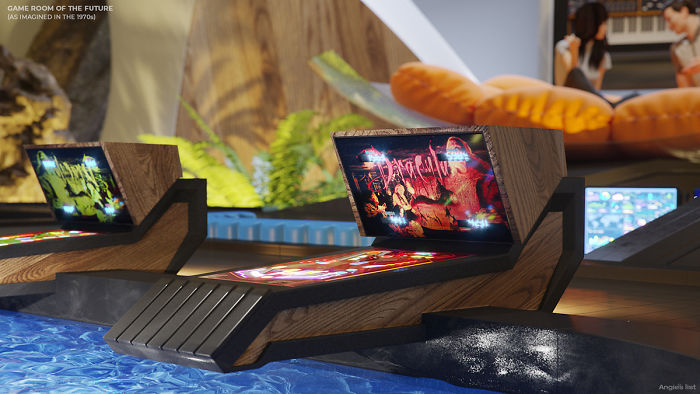
Image credits: Angie’s List
“Alexander worked in architecture and advertising, and later became a science-fiction illustrator for books and magazines. Despite once being described as ‘one of the top ‘gadget’ artists currently working in the American paperback market,’ Alexander retired when computer-assisted illustration became the norm. Imagine if he had lent his hand to video game design!”
Inspiration photo
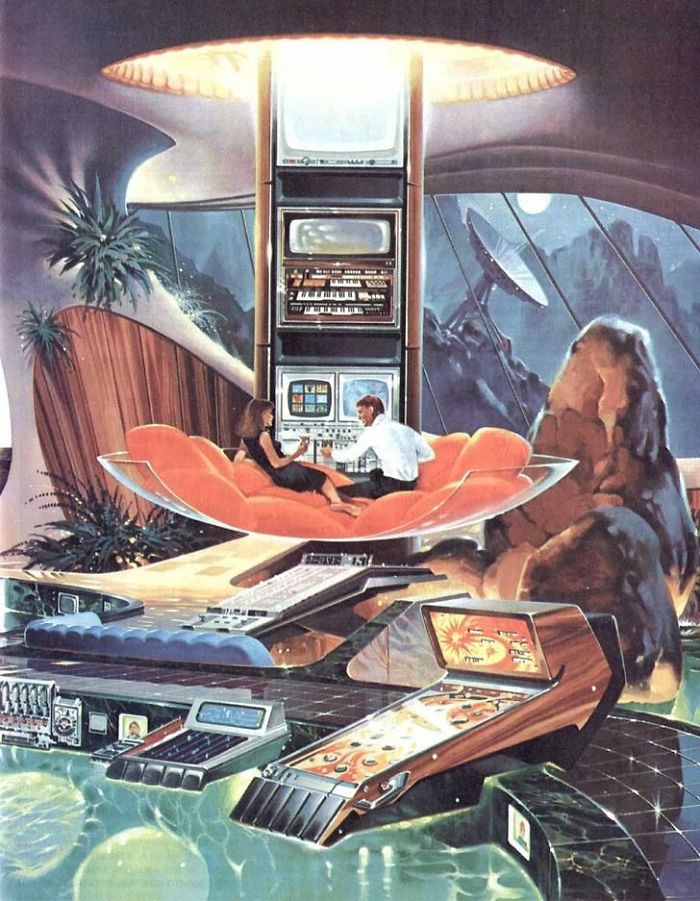
Image credits: Paul Alexander
Bathroom (1980s)

Image credits: Angie’s List
“In the 1980s, Tim Flattery and Edward Eyth were put to work imagining the year 2015 for the makers of Back to the Future II. ‘We were highly motivated to make it so we didn’t look like fools in 25 years,’ according to Eyth. Their unused bathroom design foresaw the smart home with a wall-bound ‘computerized family diagnosis & medical treatment center’–even if we’re not quite there yet.”

Image credits: Angie’s List
“The pair also reinvented bathing with their ‘horizontal bio-cleanse environ.’ These individual sanitation chambers use steam-spray and ‘sani-ray’ laser lights to scrub you clean. If you have the space for it, this centrally-oriented hygiene control center makes for a pretty cool sci-fi bathroom in which to unwind after a day out on your hoverboard.”
Inspiration photo
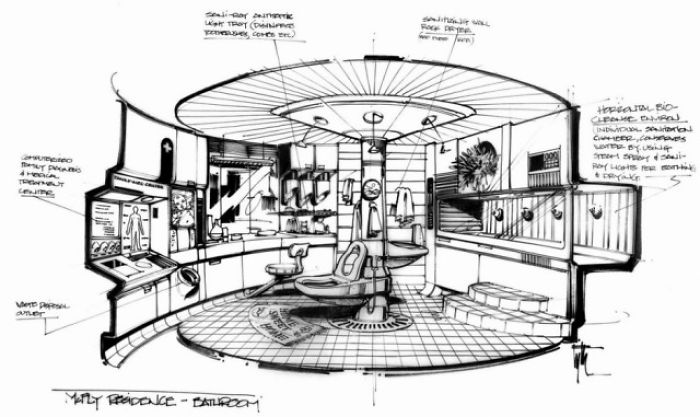
Image credits: Universal Pictures/Edward Eyth
Dressing room (1900s)
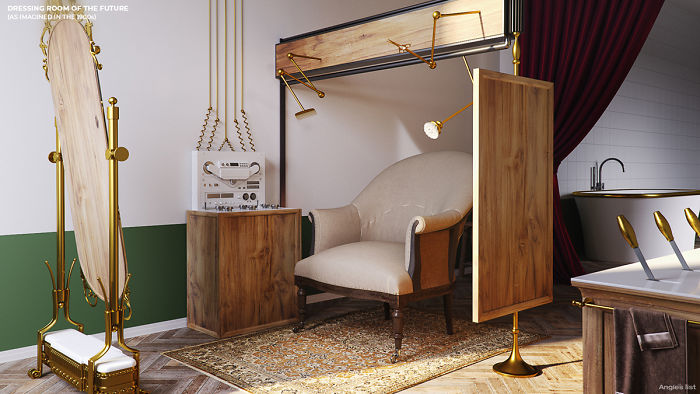
Image credits: Angie’s List
“The oldest vision in our collection is a 1900 imagining of the year 2000. ‘Madame at Her Toilette’ is a glorious steampunk dressing room, packed with mysterious levers and proto-robotic tools that are both practical and aesthetic.
The original shows Madame in the grip of articulated comb-arms and blush cushions, not so much being pampered as tortured into her look. Among the brass and teak is the control device itself, a fabulous mixing desk of buttons, lights, dials. To bring it up to date (conceptually if not technologically), we’ve added a reel-to-reel tape player that reads magnetically-stored ‘pre-set’ looks if you prefer to just sit back and let the dressing room control itself.”
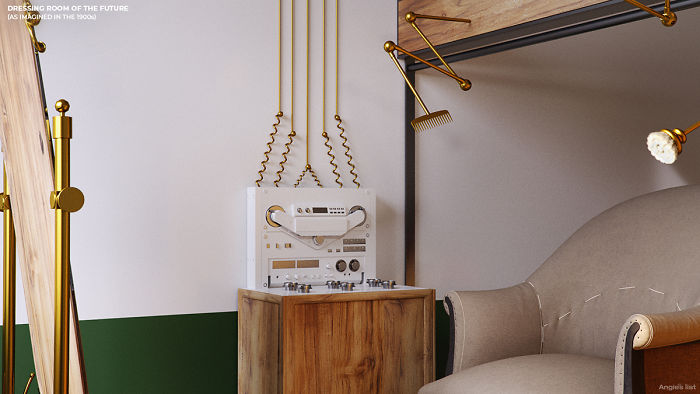
Image credits: Angie’s List
“In the 21st century, we get so caught up in the flow of technology and design progress that charming ideas from the past tend to get cast aside. So, if you plan to renovate your room with a futuristic theme, why not draw inspiration from these visions of yesteryear? Except for the waterproof living room, of course. That one’s just silly.”
Inspiration photo
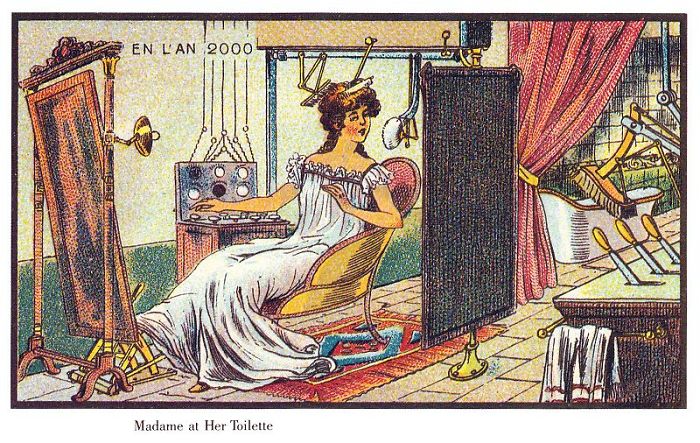
Image credits: Jean-Marc Côté
from Bored Panda http://bit.ly/2vuYBvb
via Boredpanda